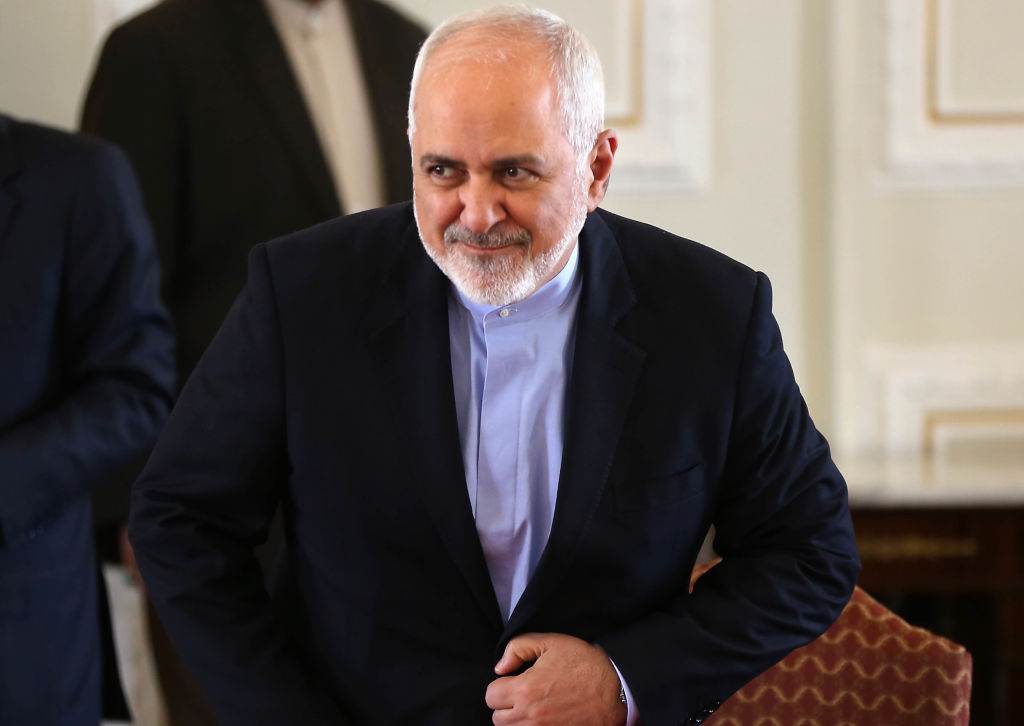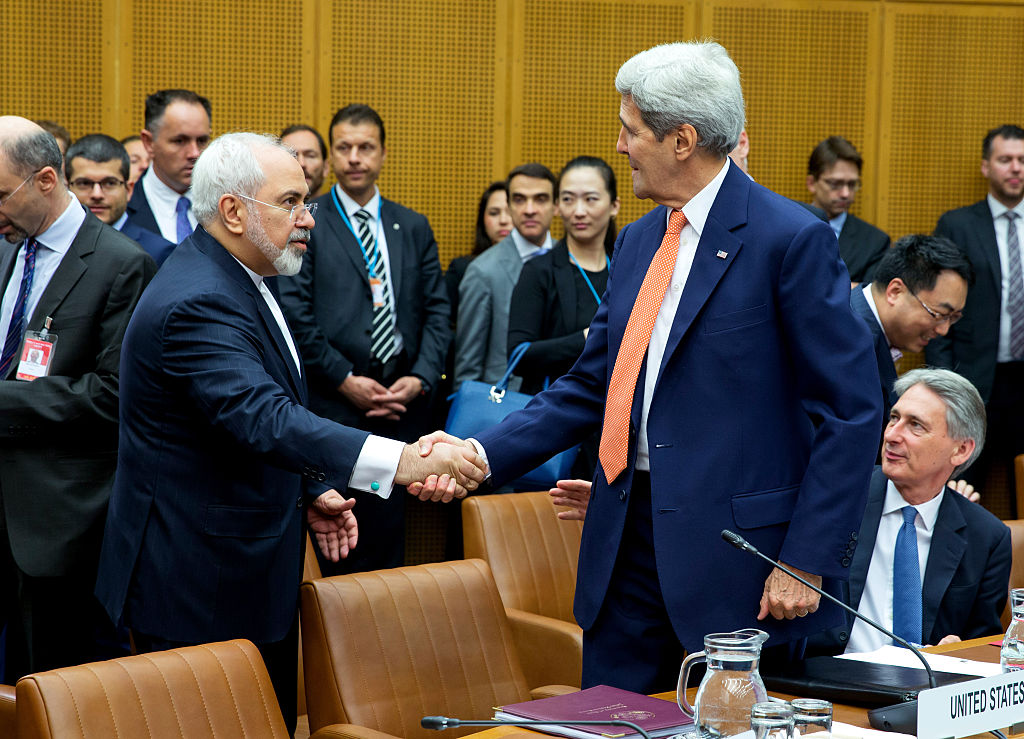
The Instagram post came at midnight, Tehran time. “I sincerely apologize for the incapacity to continue serving and all the shortcomings during the service,” Iran’s foreign minister wrote in Persian on Monday. “Be happy and proud.” The reasons why were unclear, though he later said he hoped to allow his ministry to reclaim its “proper statutory role.”
The sudden resignation of Mohammad Javad Zarif shocked many, but for Iran watchers like myself, the day had been a long time coming. For months, Iranian state media entertained rumors that Iran’s smiling top diplomat was leaving his post, something hardliners had wanted all along—though this was apparently over Zarif’s absence in meetings with Syrian President Bashar Assad, a diplomatic faux pas since neither the foreign minister nor his ministry was made aware of the visit. But then, on Wednesday morning, Iran’s President Hassan Rouhani officially rejected the resignation. In a letter to Zarif published in Iranian state media, Rouhani wrote: “I believe accepting your resignation would be against the benefit of the country, so I reject it.”
Though many Iranian officials rallied behind Zarif after his abrupt announcement, hardliners had welcomed the news that the diplomat might soon be gone. During his six years of service, Zarif has been a headache for them: U.S.-educated and having accrued a “rolodex” of Western contacts during his career, Iran’s main interlocutor has always been viewed with suspicion. His Iranian opponents have gone out of their way trying to label Zarif as having “connections to Western intelligence agencies,” in an attempt to destroy his four decades of foreign service.
Decades of experience in the international arena, specifically at the Iranian mission in New York, is rare among Iranian diplomats. And although the United States and Israel celebrated the news of Zarif’s potential departure, it would have been a double-edged sword, with the risk of damaging dialogue or potential diplomacy between Iran and the United States.
President Hassan Rouhani’s government spent all its political capital on the Joint Comprehensive Plan of Action (JCPOA) with Zarif at the helm, a 2015 deal that hardliners advocated against on the basis of Iran getting the shorter end of the stick and because of intense distrust of the United States. When U.S. President Donald Trump pulled out in May 2018, it became their I-Told-You-So moment. Hardliners in parliament were so overcome with joy that they set fire to a U.S. flag and a piece of paper symbolizing the Iran nuclear agreement while chanting, “Death to America!” and “We burned America! We burned the JCPOA!”

Pulling out of the Iran Deal brought an unknowing comradery that U.S. hawks and Iranian hardliners share until this day. Both groups have the same goal, but for different reasons.
Tehran’s hardliners want Iran to be isolated from the West to keep their hold on power and prevent any form of rapprochement, particularly with the United States, which they see as not having Iran’s best interests at heart. American politicians, particularly republicans and the Trump Administration, want to isolate Iran to change what they call “malign behavior”—though they have on numerous occasions called for regime change. Pulling out the JCPOA, has in turn emboldened these hardline forces in Tehran.
At the news of Zarif’s resignation, Secretary of State Mike Pompeo tweeted: “We note @JZarif’s resignation. We’ll see if it sticks. Either way, he and @HassanRouhani are just front men for a corrupt religious mafia. We know @khamenei_ir makes all final decisions. Our policy is unchanged—the regime must behave like a normal country and respect its people.”
To the Trump Administration, Zarif is part of a monolith not capable of reforming itself. But to Iranians he is a key influential figure—some hold him in the same light as the nationalist Prime Minister Mohammad Mossadegh who was toppled by the CIA and MI6 in 1953. One Iranian tweeted in Persian that “Zarif’s resignation has the same result as Mehdi Bazargan’s,” referring to Iran’s interim prime minister who resigned shortly after taking the post during the revolution. “The field becomes more open to hardliners.” When news of Zarif stepping down broke, a hardline Iranian journalist, tweeted: “Shut the door behind you, Yankee. Go and never come back.”
It’s not too surprising that Zarif’s resignation didn’t “stick,” as Pompeo put it. According to several Iranian MPs, Zarif has tried to resign over a dozen times, but this was the first time it was done so publicly, and thus, turned out to be a great political play of brinkmanship. President Rouhani praised Zarif less than a day after his resignation offer, while his chief of staff said that Rouhani had “a clear sign of the satisfaction of the representative of the people of Iran about the wise and effective positions and work of Dr. Zarif.” He even got the endorsement of the Islamic Revolutionary Guard Corps’ Qods Force commander Qassem Soleimani, who called him the “main person in charge of Iran’s foreign policy,” and will always be “supported and approved by senior government officials, especially by the Supreme Leader.” Zarif has, for the time being, come out on top in this domestic tug-of-war.
Had Zarif been allowed to resign, his exit would’ve inflicted damage on any possibility of detente with the United States and keeping the JCPOA alive. His critics rightfully point to the fact that he defended the indefensible—including Iran’s involvement in Syria and human rights violations inside the country—which is his job: promoting the narrative of an internationally isolated and repressive government. But beyond that, Zarif is not just an approachable government official, he is the only Iranian diplomat capable of sitting down with his U.S. counterpart to negotiate a multilateral agreement. The JCPOA, a confidence building measure, allowed Zarif to step in to de-escalate an incident during January 2016 in which two U.S. Navy vessels and their crew drifted into Iranian waters and were detained and later released.
The Trump administration merely sees Zarif’s resignation offer as part of a zero-sum game. This is problematic when there is no dialogue except empty offers to “talk,” while the U.S. carries a big stick. Even at the height of the Cold War, the United States and Soviet Union communicated. Under the current U.S. administration, we don’t even have that. Without someone like Zarif to try to talk both countries off a ledge, the United States and Iran would be more likely to go down a path of conflict.
After the initial news of Zarif’s resignation was shared online, several Iranians tweeted, “Winter is coming,” referring to the popular Game of Thrones catchphrase.
Luckily, Zarif seems to have pulled a Jon Snow resurrection for the sake of diplomacy.
More Must-Reads from TIME
- L.A. Fires Show Reality of 1.5°C of Warming
- Behind the Scenes of The White Lotus Season Three
- How Trump 2.0 Is Already Sowing Confusion
- Bad Bunny On Heartbreak and New Album
- How to Get Better at Doing Things Alone
- We’re Lucky to Have Been Alive in the Age of David Lynch
- The Motivational Trick That Makes You Exercise Harder
- Column: All Those Presidential Pardons Give Mercy a Bad Name
Contact us at letters@time.com